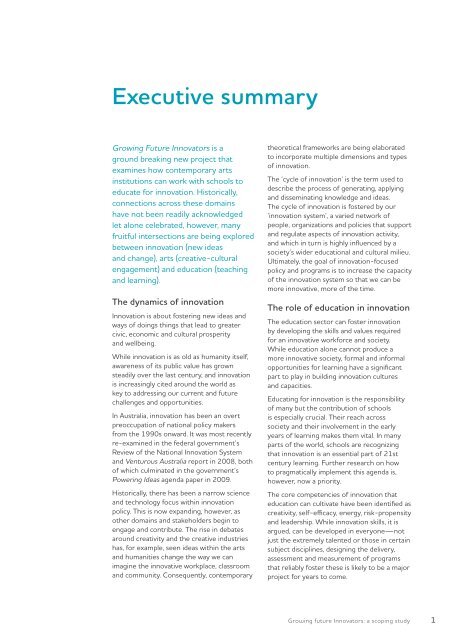GrowinG Future innovators - ARC Centre of Excellence for Creative ...
GrowinG Future innovators - ARC Centre of Excellence for Creative ...
GrowinG Future innovators - ARC Centre of Excellence for Creative ...
You also want an ePaper? Increase the reach of your titles
YUMPU automatically turns print PDFs into web optimized ePapers that Google loves.
Executive summary<br />
Growing <strong>Future</strong> Innovators is a<br />
ground breaking new project that<br />
examines how contemporary arts<br />
institutions can work with schools to<br />
educate <strong>for</strong> innovation. Historically,<br />
connections across these domains<br />
have not been readily acknowledged<br />
let alone celebrated, however, many<br />
fruitful intersections are being explored<br />
between innovation (new ideas<br />
and change), arts (creative-cultural<br />
engagement) and education (teaching<br />
and learning).<br />
The dynamics <strong>of</strong> innovation<br />
Innovation is about fostering new ideas and<br />
ways <strong>of</strong> doings things that lead to greater<br />
civic, economic and cultural prosperity<br />
and wellbeing.<br />
While innovation is as old as humanity itself,<br />
awareness <strong>of</strong> its public value has grown<br />
steadily over the last century, and innovation<br />
is increasingly cited around the world as<br />
key to addressing our current and future<br />
challenges and opportunities.<br />
In Australia, innovation has been an overt<br />
preoccupation <strong>of</strong> national policy makers<br />
from the 1990s onward. It was most recently<br />
re-examined in the federal government’s<br />
Review <strong>of</strong> the National Innovation System<br />
and Venturous Australia report in 2008, both<br />
<strong>of</strong> which culminated in the government’s<br />
Powering Ideas agenda paper in 2009.<br />
Historically, there has been a narrow science<br />
and technology focus within innovation<br />
policy. This is now expanding, however, as<br />
other domains and stakeholders begin to<br />
engage and contribute. The rise in debates<br />
around creativity and the creative industries<br />
has, <strong>for</strong> example, seen ideas within the arts<br />
and humanities change the way we can<br />
imagine the innovative workplace, classroom<br />
and community. Consequently, contemporary<br />
theoretical frameworks are being elaborated<br />
to incorporate multiple dimensions and types<br />
<strong>of</strong> innovation.<br />
The ‘cycle <strong>of</strong> innovation’ is the term used to<br />
describe the process <strong>of</strong> generating, applying<br />
and disseminating knowledge and ideas.<br />
The cycle <strong>of</strong> innovation is fostered by our<br />
‘innovation system’, a varied network <strong>of</strong><br />
people, organizations and policies that support<br />
and regulate aspects <strong>of</strong> innovation activity,<br />
and which in turn is highly influenced by a<br />
society’s wider educational and cultural milieu.<br />
Ultimately, the goal <strong>of</strong> innovation-focused<br />
policy and programs is to increase the capacity<br />
<strong>of</strong> the innovation system so that we can be<br />
more innovative, more <strong>of</strong> the time.<br />
The role <strong>of</strong> education in innovation<br />
The education sector can foster innovation<br />
by developing the skills and values required<br />
<strong>for</strong> an innovative work<strong>for</strong>ce and society.<br />
While education alone cannot produce a<br />
more innovative society, <strong>for</strong>mal and in<strong>for</strong>mal<br />
opportunities <strong>for</strong> learning have a significant<br />
part to play in building innovation cultures<br />
and capacities.<br />
Educating <strong>for</strong> innovation is the responsibility<br />
<strong>of</strong> many but the contribution <strong>of</strong> schools<br />
is especially crucial. Their reach across<br />
society and their involvement in the early<br />
years <strong>of</strong> learning makes them vital. In many<br />
parts <strong>of</strong> the world, schools are recognizing<br />
that innovation is an essential part <strong>of</strong> 21st<br />
century learning. Further research on how<br />
to pragmatically implement this agenda is,<br />
however, now a priority.<br />
The core competencies <strong>of</strong> innovation that<br />
education can cultivate have been identified as<br />
creativity, self-efficacy, energy, risk-propensity<br />
and leadership. While innovation skills, it is<br />
argued, can be developed in everyone—not<br />
just the extremely talented or those in certain<br />
subject disciplines, designing the delivery,<br />
assessment and measurement <strong>of</strong> programs<br />
that reliably foster these is likely to be a major<br />
project <strong>for</strong> years to come.<br />
Growing future Innovators: a scoping study 1




![Plebiscite (Riegert chapter) revised FINAL [Feb 14].pdf](https://img.yumpu.com/8710373/1/190x245/plebiscite-riegert-chapter-revised-final-feb-14pdf.jpg?quality=85)